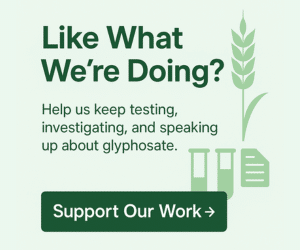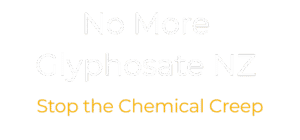When “Safe” Needs Legal Protection
In Georgia, lawmakers just passed a bill to protect Bayer, the maker of the glyphosate-based herbicide Roundup, from future lawsuits that claim the product caused harm. They’re not alone. At least four other U.S. states have already signed similar laws. And more may follow.
Which begs the question:
If glyphosate is so safe, why does Bayer need shielding from lawsuits at all?
This isn’t just a legal maneuver. It’s a red flag.
Who Are They Really Protecting?
These new laws are framed as protecting farmers and product makers from “unfair litigation.” But look a little closer and it’s clear who’s getting the real protection: corporate manufacturers, not the everyday people using—or exposed to—these products.
Let’s be clear. We’re not talking about banning Roundup. We’re talking about blocking the right to sue when something goes wrong. People who believe they were harmed by glyphosate—including cancer patients—are being told: Sorry, the state has decided you can’t take this company to court.
Lawmakers Say: Trust the Label
In Georgia’s case, the bill prevents lawsuits as long as the pesticide product’s label was approved by the EPA. But here’s the catch:
EPA approval doesn’t mean a product is safe—only that it meets current regulatory standards, which are often based on industry-supplied data, limited independent testing, and sometimes, decades-old science.
In fact, the EPA’s own assessment of glyphosate’s cancer risk has been called into question multiple times—both within the agency and by outside experts.
A Pattern of Corporate Immunity
This isn’t the first time big companies have sought legal shields. It’s becoming a pattern:
- The pharmaceutical industry enjoys sweeping immunity under U.S. law for vaccine injury claims, through the National Childhood Vaccine Injury Act.
- Monsanto/Bayer has fought tirelessly to limit jury trials and delay compensation payments in existing glyphosate lawsuits.
- And now, states themselves are stepping in to close the courtroom door on future plaintiffs—before they even have a chance to speak.
It’s not just about liability. It’s about power—who holds it, who loses it, and how quietly it’s being transferred.
“In New Zealand, we don’t need shield laws—because the public can’t sue in the first place.”
What About New Zealand?
You might be thinking: “That’s the U.S.—it doesn’t affect us.” But here’s the kicker: in New Zealand, we can’t sue for chemical injury in the same way. Not because there’s nothing to sue over—but because we’ve handed that power over to the Accident Compensation Corporation (ACC).
ACC is designed to provide no-fault compensation for injuries. In theory, that sounds fair and streamlined. In practice, it means individuals harmed by chemical exposure—whether it’s from glyphosate, workplace toxins, or medical interventions— often hit a brick wall when trying to get meaningful recognition or accountability.
That said, there have been some accepted ACC claims involving glyphosate and Roundup. Since 1990, ACC has approved:
- 359 claims involving Roundup, with payouts totaling around $875,000
- 20 claims specifically mentioning glyphosate, with payouts totaling about $6,241
- However, none of the accepted Roundup claims were classified as gradual process injuries, the category that would include long-term exposure or chronic illness
$875,000 divided across 359 claims comes out to just over $2,400 per claim.
That’s not cancer compensation. That’s a surface-level injury payout.
Now here’s what makes that number matter:
It suggests most accepted claims likely involved immediate, short-term injuries—like chemical burns or eye exposure—not chronic diseases that take years to develop.
And that’s the real problem.
Our system recognizes burns—but not cancers.
Acute exposure gets a payout.
Long-term accumulation? You’re on your own.
Try bringing a case for something like non-Hodgkin lymphoma linked to repeated exposure over decades. You’ll likely find it’s nearly impossible to get ACC to accept the cause. Even harder to get compensation. And there’s no civil litigation alternative.
So while U.S. lawmakers are busy blocking lawsuits, here in Aotearoa, the legal pathway was quietly closed off decades ago. No protest. No shield laws. Just silence.
And maybe that’s even more concerning.
Because when you can’t sue, can’t prove harm under a narrow definition, and can’t challenge the system in court…
who’s left to hold the chemical industry accountable?
Not the regulators.
Not the manufacturers.
And certainly not the average New Zealander trying to keep their family safe.
Final Thought
Protecting public health shouldn’t come second to protecting corporate profits. When governments start writing shields into law, it’s time for citizens to start asking better questions.
Because if your product is truly safe,
you shouldn’t need immunity from those it harms.
Resources & References:
Sometimes the footnotes tell the real story.
These links aren’t just sources—they’re fragments of a bigger picture. From billion-dollar settlements to the fine print of ACC data, what’s between the lines matters just as much as what’s in bold. If you want to understand how public health and corporate power collide, this is a good place to start.
Georgia Shields Bayer from Roundup Lawsuits – High Plains Journal (2025)
A recent example of U.S. legislation designed to block legal action against Bayer over Roundup harm. Georgia joins a growing list of states offering legal shields.
https://hpj.com/2025/05/27/georgia-shields-bayer-from-roundup-lawsuits/
Bayer to Pay Up to $10.9 Billion to Settle Monsanto Weedkiller Lawsuits – Reuters (2020)
Despite denying wrongdoing, Bayer agreed to pay nearly $11 billion to resolve lawsuits linking glyphosate to cancer—one of the largest civil settlements in U.S. history.
https://www.reuters.com/article/us-bayer-glyphosate-settlement-idUSKBN23V2NP
Roundup Tops ACC List for Herbicide Injuries – RNZ (2024)
ACC has accepted 359 claims involving Roundup since 1990—mostly acute injuries like eye and skin exposure. Chronic illness claims remain largely unrecognized.
https://www.rnz.co.nz/news/national/540247/roundup-tops-acc-list-for-herbicide-pesticide-and-insecticide-injuries
Farmer’s Payout for 2,4,5-T Exposure ‘Tip of the Iceberg’ – RNZ (2024)
A rare example of a successful ACC claim for herbicide-related illness tied to the banned chemical 2,4,5-T. The case took years and multiple denials to succeed.
https://www.rnz.co.nz/news/national/535739/farmers-payout-for-2-4-5-t-herbicide-exposure-tip-of-the-iceberg-lawyer-says
Bayer’s Legal Woes: The Roundup Lawsuit Fallout – NoMoreGlyphosate.nz
A breakdown of Bayer’s ongoing legal challenges around glyphosate, and what New Zealand can learn from the thousands of international lawsuits.
https://nomoreglyphosate.nz/bayers-legal-woes-roundup-lawsuit-fallout/
Why Raising MRLs Threatens Public Health – NoMoreGlyphosate.nz
Explores New Zealand’s proposed increase in glyphosate residue limits and the hidden risks of aligning our standards with global trade partners over local health.
https://nomoreglyphosate.nz/raising-mrls-public-health-risk/
It’s easy to say “trust the system”—until you look at how the system actually works.
These articles don’t claim to have all the answers. But they raise the kinds of questions we can’t afford to ignore. Because when accountability is optional, awareness becomes essential.
Further Reading
Some of the following books are linked to Amazon.com for your convenience. If you decide to purchase through these links, we may earn a small commission — at no extra cost to you.
Whitewash: The Story of a Weed Killer, Cancer, and the Corruption of Science
By Carey Gillam
A deeply researched exposé of Monsanto’s efforts to manipulate science, suppress evidence, and protect glyphosate’s reputation at all costs. Written by a former Reuters journalist turned whistleblower.
Whitewash [our review]
Toxic Legacy: How the Weedkiller Glyphosate Is Destroying Our Health and the Environment
By Stephanie Seneff, PhD
MIT scientist Stephanie Seneff lays out her controversial yet compelling argument that glyphosate is a key driver of many modern health epidemics—from cancer to autism to gut disorders.
Toxic Legacy [our review]
Poison Spring: The Secret History of Pollution and the EPA
By E.G. Vallianatos & McKay Jenkins
A former EPA insider details how regulatory capture, political interference, and corporate influence have eroded the agency’s ability to protect the public from pesticides and herbicides.
Poison Spring [amazon.com]
Silent Spring: The Classic That Launched the Environmental Movement
By Rachel Carson
The classic that started it all. While written decades ago, Carson’s warning about the unchecked use of chemicals in agriculture and their ripple effects on nature and health is eerily relevant today.
Silent Spring [amazon.com]
The Monsanto Papers: Deadly Secrets, Corporate Corruption, and One Man’s Search for Justice
By Carey Gillam
A gripping legal drama based on the landmark Dewayne Johnson v. Monsanto case. It humanizes the battle against Roundup and shows just how high the stakes are when truth goes up against profit.
The Monsanto Papers [our review]
Image Source & Attribution
We’re grateful to the talented photographers and designers whose work enhances our content. The feature image on this page is by anuta23. You can find more of their work here: https://www.123rf.com/profile_anuta23.




